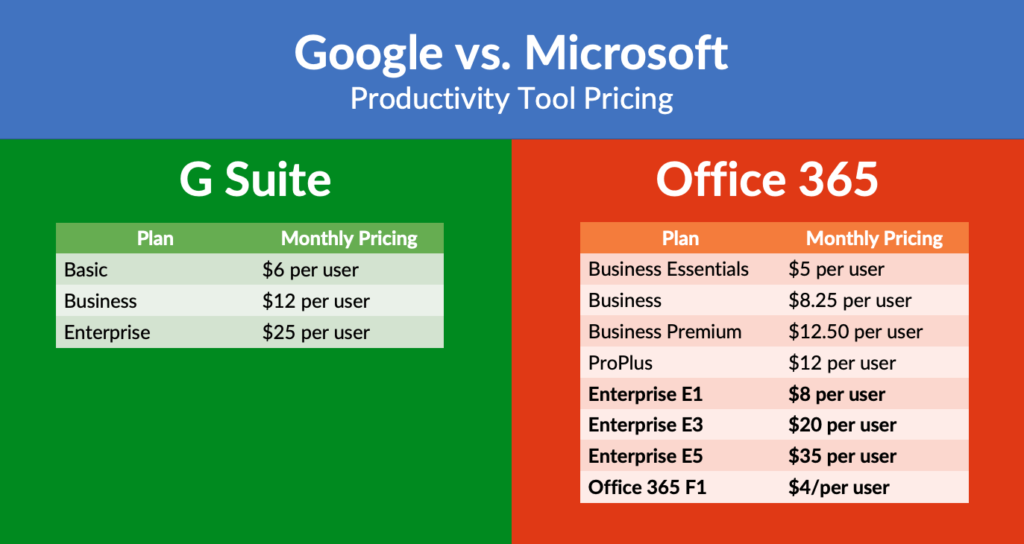- Adam Mansfield
- Reading Time: 4 minutes

You’ve likely heard that Google Cloud increased the price of G Suite Basic and Business plans. If you are part of an enterprise, you may have dismissed the announcement as irrelevant to you – but not so fast. This price increase foreshadows what is likely to come for enterprise customers and reveals where Google is headed. Understanding the significance and implications of this announcement will benefit any enterprise currently using or considering G Suite as an alternative to Microsoft Office 365.
Gaining G Suite Momentum
Before getting into the announcement itself and the implications, it is important to mention that Google G Suite adoption is ramping and is absolutely becoming a viable solution for enterprise customers. To put some numbers around this, Google has reported that the number of G Suite customers has doubled since 2015. Google also reported that 4 million businesses use G Suite today and Google Cloud’s parent company, Alphabet, reported $1B per quarter in Google Cloud revenue (which includes G Suite) in its Q4 FY17 earnings call early last year. We know through estimates that G Suite represents about half of that revenue. That means, through some extrapolation, about $2B in revenue each year is tied to G Suite.
How Much is G Suite’s Price Increasing?
Pricing associated with Google’s G Suite Basic and Business plans will increase by 20% effective April 2, 2019. The G Suite Basic plan will go from $5 per user/month to $6 per user/month and the G Suite Business plan will go from $10 per user/month to $12 per user/month. As mentioned before, the Enterprise plan pricing will not be affected at this time and will remain at $25 per user/month.
Even after the increase, this pricing is still in line with its biggest competitor, Microsoft Office 365. The graphic below shows how the new G Suite pricing compares to Office 365 pricing.

Nudging Customers to Annual Plans
If you’re a Basic or Business customer under the flexible month-to-month plan, you will be hit with this price increase in April of 2019. However, if you’re on an annual plan with Google, you won’t see this price increase until your next renewal. In other words, Google is sending the message that there are benefits to going on an annual G Suite plan.
Pricing cloud products in a way that incentivizes customers to make longer commitments is a common tactic among cloud vendors. Vendors would much rather have customers on long-term subscriptions which not only comes with committed extended revenue but also the high likelihood of vendor lock-in.
In this case, Google is hinting at the idea that your pricing may be “safer” if you are on an extended term plan rather than month-to-month. This move is a sign of Google’s efforts to encourage small businesses and large enterprises to think more in terms of long-term commitments if they want better price certainty.
Thomas Kurian’s First Public Move
Not only is this the first ever price increase to G Suite since it was launched over a decade ago, but it also happens to be the first real move Google Cloud made since Thomas Kurian took the reins. He replaced Diane Greene who was hired in 2015 to ramp up Google Cloud’s Enterprise presence. With over two decades of experience working at enterprise- focused Oracle, Kurian is expected to drive Google Cloud’s presence in the enterprise even further.
So, why did Kurian start with the Basic and Business plans instead of starting with the Enterprise plan? In short, it’s a smart and great way to test the market. Despite these increases only directly affecting small to mid-size businesses, Google can learn from the reactions and results of this price increase and apply their learnings to ensure they approach the highly coveted enterprise market in the most effective way. They certainly can’t afford to ruffle the feathers of any current enterprise customer that made the leap from Microsoft in the first place.
What Enterprises Can Expect
As the old saying goes, the best predictor of future behavior is past behavior. Current enterprise customers and those seriously evaluating Google G Suite as an alternative to Microsoft’s Office 365 plan should anticipate a possible increase to Enterprise pricing.
If you evaluated or already adopted Google G Suite for your enterprise, you hopefully saw or achieved deep discounting. Google aggressively offers discounts or free trials to entice you to replace Office 365 with G Suite or choose it for specific workers within your enterprises workforce such as firstline workers.
This is problematic because there will be a renewal and if you’re used to paying a significantly lower price or nothing at all, facing a sudden price increase in Google’s Enterprise list pricing in addition to losing your deep discount will be a tough pill to swallow. It will be extremely difficult at that point in time to not accept the increase because realistically, where are you going to go? The only viable alternative will most likely still be Microsoft, but don’t expect favorable pricing from them. They also know you have nowhere to go.
Actions to Take
- If you are a current Enterprise G Suite customer, ask Google how this price increase will affect you in the future. Sure, it makes sense that they are increasing the price after 10 years of adding more value but what if you haven’t realized any of that value yet?
- If you haven’t adopted G Suite yet, be sure to get commitments that you won’t see a price increase for a meaningful period of time after adoption. You need to make sure you not only have protections tied to the price you achieved but also the list price.
- If you are an Office 365 customer, ask Microsoft what pricing commitments they are willing to make and use Google’s behavior as an example of something that your enterprise would never accept. Make it clear that Microsoft will further solidify themselves as your cloud vendor of choice by giving extended commitments.
Google has already significantly increased its focus on large enterprise deals and has become more aggressive as it tries to grab market share. Its efforts to sell to the enterprise will only get stronger. This announcement is a reason to open dialogue with Google and ask what commitments you can get to ensure your enterprise will be protected not just today but even more importantly, in the future.
Follow me on Twitter @Adam_Mansfield_ find my other UpperEdge blogs and follow UpperEdge on Twitter and LinkedIn
Related Posts
Related Blogs
AWS and Google Double Down on Cloud and AI: What Enterprise Buyers Need to Know From the Vendors’ Earnings
Microsoft and Google Are Forcing Customers to Adopt AI at a Premium Price: What Customers Need to Know
Consumers Are the Gateway to Enterprise Adoption: Microsoft vs. Google
About the Author
